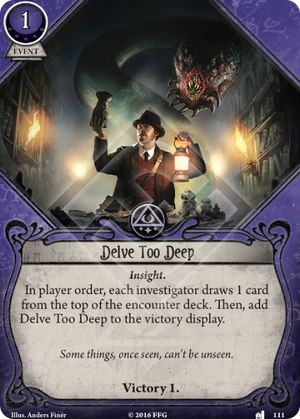
Still a staple for me in Dunwich - lord knows the xp is most welcome in that campaign...
(Now to find a way to make this 200 characters. If I dream big enough, there's some kind of chance that this might do it.)

Still a staple for me in Dunwich - lord knows the xp is most welcome in that campaign...
(Now to find a way to make this 200 characters. If I dream big enough, there's some kind of chance that this might do it.)
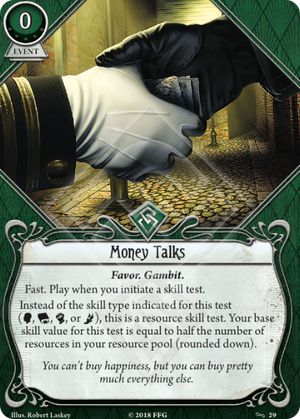
I don't like this card.
Whenever I tried to play a big money rogue, I put two of these in without thought. Not anymore.
1) It is a dead draw in early game. Without your resource engine going on, this is worthless. You can't even commit it for skill icons.
2) It is mostly dead in early scenarios. Big money engines needs some xp to fire on all cylinders. Before that, you won't find yourself sitting on a lot of resources. Don't forget big money decks loves to spend resources as much as they love to amass them.
3) If you struggled through the worst, congratulations: This is now a very strong card, almost an auto success barring tentacles, against any type of test. But was it worth to carry it all along the early scenarios? Maybe pay the 1 xp tax and bring this into your deck later? You'd probably pay 2 xp for the improved version at that point. But since you upped the budget, is going even further to buy Sure Gamble better(I for one would rather have Sure Gamble)? If you are going to pay xp for these, when would you do it? After the third scenario? Sixth?
Therefore I think this card is a semi-trap. Don't get me wrong, payoff is there, but I just think this is another one of Rogue luxuries instead of a big money archetype cornerstone. A weird one that is, at 0 xp. Obviously you can choose to struggle with these early, and reap the rewards later (kinda similar to Delve Too Deep). I just want to point out that it's not all roses.
Amazing Adaptable target though.
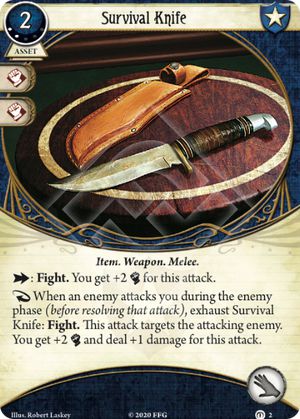
This is a great upgrade! Let's go over what you get for 2 xp:
Headliner first: The reaction is changed from "After an enemy attack deals damage to you during the enemy phase" to "When an enemy attacks you during the enemy phase (before resolving that attack)". The other commenter already pointed out how this means that you can avoid taking damage from incoming attacks altogether so long as you kill the enemy, which is indeed great when it lines up, but can be a bit situational. There are two other consequences of this change that make the knife much less situational than it was before. Since it triggers on attack instead of damage, enemies that only deal horror can no longer attack you with impunity! Since it triggers on attack instead of assigned damage, the weapon now pairs well with soak - your allies can take the brunt of the attack and you can stab the enemy back with a vengeance. These changes mean that you can rely on the reaction in a way that you couldn't before, I love it.
A second on the activation. Usually this would be the headliner on a weapon upgrade, but since this is usually your offhand weapon it ends up being fairly low impact. But when the draws don't line up and this is all you have, it's a welcome boon - another boost to the weapon's versatility; its worst case scenario is less bad.
A second on commit. Not bad, added versatility!
Overall, I really like upgrades that take a situational card and make it feel smooth. The previous knife felt like it had high highs but frequent awkward lows. This upgrade brings up the floor quite a bit and also gives you new highs to explore: suddenly the hunter keyword just saves you the work of moving to them. If you ever kill an enemy without taking a single action or taking a single damage, it just feels incredible.
Never bring a mysterious glowing eyes to a knife fight.
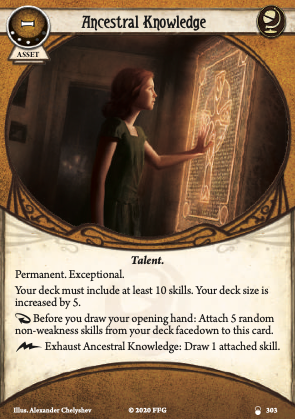
What happens when you purchase this card? I mean your deck size is suddenly increased by 5, so you immidiately lack 5 cards in your deck. Can you just take five lvl 0 cards for free, or do you have to buy them?
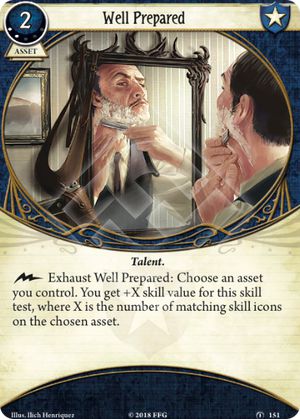
Could be excellent with the just announced toolbelt from the Scarlet Keys. The toolbelt may blank the textbox of the item,but it doesnt remove the icons.
It does depend on what the tool icons are,of course.